

Cognitive poetics. Due to its focus on how readers process the language of texts, cognitive poetics represents simultaneously a turn back in time, to the ancient study of rhetoric;[1] but it also has a grounding in modern principles of cognitive linguistics.
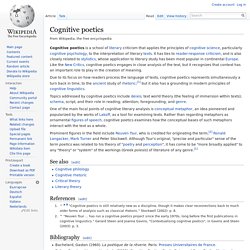
One of the main focal points of cognitive literary analysis is conceptual metaphor, an idea pioneered and popularized by the works of Lakoff, as a tool for examining texts. Rather than regarding metaphors as ornamental figures of speech, cognitive poetics examines how the conceptual bases of such metaphors interact with the text as a whole. See also[edit] References[edit] Cognitive rhetoric. Cognitive rhetoric refers to an approach to rhetoric, composition, and pedagogy as well as a method for language and literary studies drawing from, or contributing to, cognitive science.
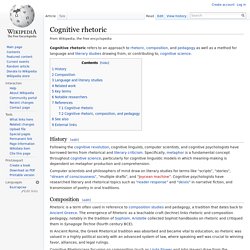
History[edit] Following the cognitive revolution, cognitive linguists, computer scientists, and cognitive psychologists have borrowed terms from rhetorical and literary criticism. Specifically, metaphor is a fundamental concept throughout cognitive science, particularly for cognitive linguistic models in which meaning-making is dependent on metaphor production and comprehension. Composition[edit] Rhetoric is a term often used in reference to composition studies and pedagogy, a tradition that dates back to Ancient Greece. In Ancient Rome, the Greek Rhetorical tradition was absorbed and became vital to education, as rhetoric was valued in a highly political society with an advanced system of law, where speaking well was crucial to winning favor, alliances, and legal rulings.
James A. Related work[edit] Stylistics (field of study) Stylistics is the study and interpretation of texts in regard to their linguistic and tonal style.
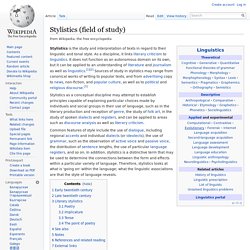
As a discipline, it links literary criticism to linguistics. It does not function as an autonomous domain on its own, but it can be applied to an understanding of literature and journalism as well as linguistics.[1][2] Sources of study in stylistics may range from canonical works of writing to popular texts, and from advertising copy to news, non-fiction, and popular culture, as well as to political and religious discourse.[3] The analysis of literary style goes back to the study of classical rhetoric, though modern stylistics has its roots in Russian Formalism[4] and the related Prague School of the early twentieth century.
In 1909, Charles Bally's Traité de stylistique française had proposed stylistics as a distinct academic discipline to complement Saussurean linguistics. As well as conventional styles of language there are the unconventional – the most obvious of which is poetry. Ed. Cognitive poetics. Due to its focus on how readers process the language of texts, cognitive poetics represents simultaneously a turn back in time, to the ancient study of rhetoric;[1] but it also has a grounding in modern principles of cognitive linguistics.
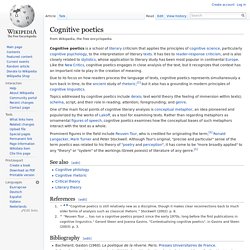
One of the main focal points of cognitive literary analysis is conceptual metaphor, an idea pioneered and popularized by the works of Lakoff, as a tool for examining texts. Rather than regarding metaphors as ornamental figures of speech, cognitive poetics examines how the conceptual bases of such metaphors interact with the text as a whole. See also[edit] References[edit] Linguist List - Reviews Available for the Book. A cognitive stylistic analysis of J.R.R. Tolkien's fantasy world of Middle-earth - Glasgow Theses Service.
Bragina, Jekaterina (2012) A cognitive stylistic analysis of J.R.R.
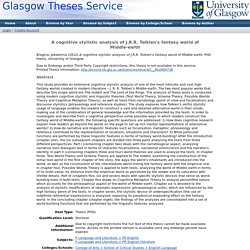
Tolkien's fantasy world of Middle-earth. PhD thesis, University of Glasgow. Due to Embargo and/or Third Party Copyright restrictions, this thesis is not available in this service. This study provides an extensive cognitive stylistic analysis of one of the most intricate and vast high fantasy worlds created in modern literature – J. R. Cognitive stylistics. Documents in Cognitive Stylistics. The audience had been given this abstract as a teaser: "Teaching generative morphology – an interface between classical and modern forms of linguistics that was taking birth as a new discipline – my teacher Mark Aronoff, in 1977, remarked... more The audience had been given this abstract as a teaser: "Teaching generative morphology – an interface between classical and modern forms of linguistics that was taking birth as a new discipline – my teacher Mark Aronoff, in 1977, remarked that people often say “I’ve never heard that word before”, but that they never say “I’ve never heard that sentence before”.
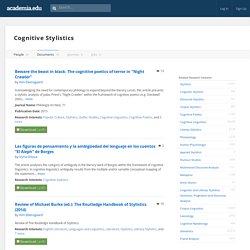
Indeed, when you listen to a sentence, you never expect to have heard it before. You assume that every sentence you hear is new, is being uttered for the first time. In contrast, when you encounter a word like ‘phenoculate’, it makes sense to ask if you are hearing it for the first time.